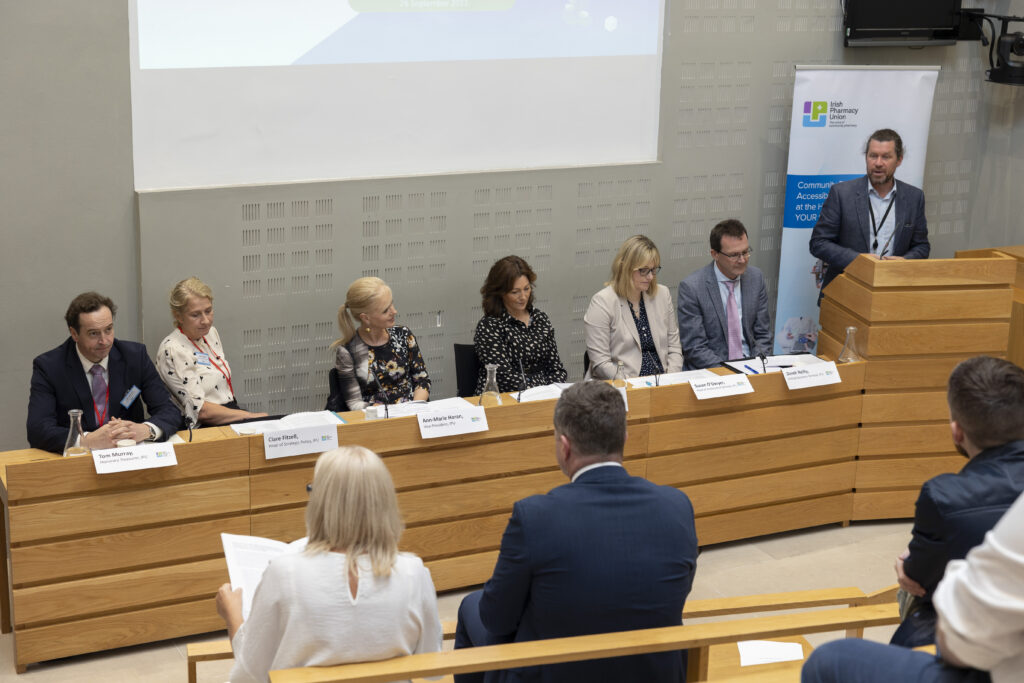Home » Pharmacy issues raised as Oireachtas comes back into session
The Dáil resumed session on 20 September, shortly before we went to print on your October issue of the IPU Review, so this month’s political report is relatively short. However, there were a number of pertinent questions raised before the Oireachtas summer break in late July, and in this article, Brian Harrison, Director at MKC Consulting, provides an overview of the issues raised.

With the expansion of the free contraception scheme from early September a number of questions surrounding contraception have been raised in the Dáil.
Deputy David Cullinane (Waterford, Sinn Féin) raised the expansion of the scheme to the Minister for Health asking; “the timeline for extension of the free contraception scheme to girls aged 16, the timeframe for further extensions and what consultation his Department has undertaken to progress this issue.”
Responding for the Minister of Health, Minister of State with responsibility for Public Health, Well Being and the National Drugs Strategy, Hildegarde Naughton (Galway West, Fine Gael) explained; “The free contraception scheme for women was launched in September 2022, initially for women aged 17-25 who are ordinarily resident in Ireland. The scheme has now been expanded to include 26-year-olds from 1 January 2023, and will be expanded further, in September, to include women aged 27-30. Approximately €32 million has been assigned to support the scheme in 2023.”
Continuing, Minister of State Hildegarde Naughton said; “Funding through Budget 2023 was also allocated to expand the scheme to 16 year-olds, subject to legal advice and consultation across Government. The proposal is under consideration by the Department of Health’s Legal Unit regarding potential legal issues arising.”
Deputy Seán Sherlock (Cork East, Labour) further questioned the Minister of Health on, “the type of data being compiled to inform further development of the free contraception service”.
Minister Naughton again responded for the Minister for Health, saying, “The Minster expects to shorty receive more detailed data about the usage of the contraception scheme, including the number of unique individuals accessing the scheme, a breakdown by age and what types of contraception are accessed, in addition to high level monthly budgetary reporting that is already provided.”
Deputy Seán Sherlock (Cork East, Labour) also asked, “what funding has been allocated to the ICGP to provide training and certification to health care professionals on long-acting reversible contraception insertion in 2022 and 2023”, and also the number of healthcare professionals who have availed of training.
Again, responding for the Minister of Health, Minister Hildegarde Naughton said, “For eligible women, the free contraception scheme provides for the full cost of consultations, prescriptions, fittings, removals and check-ups related to the wide range of contraception also available to GMS card holders on the Re-Imbursement List.”
Deputy Jackie Cahill (Tipperary, Fianna Fáil) has questioned the Minister for Health, “if his Department has investigated the reason that fewer young pharmacists appear to be going into community practice and if any studies are ongoing in relation to this.”
Responding, Minister Donnelly said, “While the Department has not directly undertaken a review of the practice areas of registered pharmacists, it is aware of certain pertinent ongoing work. The Emerging Risks to Pharmacy Workforce project, a multi-annual project commenced by the Pharmaceutical Society of Ireland to assess emerging risks to the continued availability of a professional pharmacy workforce within community and hospital pharmacy in Ireland is relevant.”
Minister Donnelly explained that a working group was established as part of the project, involving Department of Health, HSE, PSI, academia and pharmacy representative organisations.
Continuing, the Minister said, “I have been informed that the analysis conducted as part of the project did not indicate that fewer early career pharmacists are entering community pharmacy practice, with 73% of all pharmacists working in the community pharmacy setting (either as their sole role, or as one of multiple roles). Four out of five of the fifth-year pharmacy students who responded to the survey indicated their intention to enter patient-facing practice upon registration (i.e., in either community or hospital practice). However, the data gathered as part of this project established a baseline view, and trends over time will need to be measured via future surveys to understand if the proportion of the register working in community pharmacy increases, decreases or remains static.”
Deputy Colm Burke (Cork North Central, Fine Gael) has questioned the Minister for Health on, “what action is being taken to ensure that pharmacies and hospitals have access to sufficient supplies of insulin”.
In response, Minister for Health Stephen Donnelly TD (Wicklow, Fianna Fáil) said; “At any given time, shortages of medicines can occur in any country.” According to Minister Donnelly there are currently 150 insulin-containing medicines authorised in Ireland: “One product, Fiasp 100 units/ml solution for injection in a vial from Novo Nordisk, is the only one notified as in short supply currently to the HPRA.”
Commenting on the actions taken to combat shortages, Minster Donnelly stated, “Ireland has a multi-stakeholder medicine shortage framework in place, operated by the Health Products Regulatory Authority (HPRA) on behalf of the Department of Health. The multi-stakeholder framework includes representation from the pharmaceutical industry, healthcare professionals, the HSE, the Department of Health and patients.”
Emer Higgins TD (Dublin Mid West, Fine Gael) subsequently raised medicine shortages to the Tánaiste; “Right now across Ireland, there are 307 medicines in short supply, including tablets people rely on for their blood pressure, cholesterol or mental health and medicines people require to regulate their hormones, their breathing or their insulin.”
Deputy Higgins stated that, “People with medical conditions are facing a record shortage of drugs. That is causing huge anxiety for them, their families and their pharmacists. About 60% of the population will be impacted in some way. This matter has been raised with me by people having trouble accessing medicine, people who are concerned they will not be able to fill prescriptions for their children and by my own local pharmacist.”
In response the Tánaiste, Micheál Martin TD (Cork South Central, Fianna Fáil) said; “In terms of the broader picture, there are global supply chain issues. We have a fairly sophisticated system in Ireland. There have been some issues post-Brexit in respect of medicine supplies. The Deputy can rest assured that the Government, the HPRA, and others are doing everything they possibly can in respect of shortages.”
Colm Burke TD (Cork North Central, Fine Gael) quizzed the Minister of Health on the drugs payment scheme, asking; “if he will give due consideration to the inclusion of nicotine replacement therapy (NRT) and other smoking cessation supports in the drug payment scheme, in light of the costs of smoking on the health service.”
In response, Minister Donnelly noted; “The Stop Smoking National Clinical Guideline, published in 2022, recommends Varenicline alone or in combination with Nicotine Replacement Therapy (NRT) as a first-line treatment, and a combination of two forms of NRT if Varenicline is not available. Bubropion and single forms of NRT are recommended as second-line treatments. Varenicline and Bubropion are currently included under both the General Medical Services Scheme (GMS) and the Drug Payment Scheme (DPS).”
Furthermore, Minister Donnelly confirmed that, his “Department will continue to monitor the framework for access to stop smoking medication in view of the Clinical Guideline and our continuing commitment to achieve a Tobacco Free Ireland.”
David Cullinane TD (Waterford, Sinn Féin) has questioned the Minister of Health on “the cost of abolishing prescription charges, by age cohort and total”.
Breaking down the costs, Minister Donnelly stated, “Based on the year-to-date level of activity on the GMS Scheme, the estimated cost of abolishing prescription charges for those eligible would be €85.56 million per annum.”
This is broken down as follows:
Minister Donnelly also noted; “this costing is subject to the following caveats, that demographic changes may impact the number of eligible persons, and that the removal of prescription charges may result in a change in claimant behaviour.”
Róisín Shortall TD (Dublin North West, Social Democrats) asked the Minister of Health for an “update on the review of the medical cannabis access programme”.
In response Minister Donnelly stated that; “A clinical review of the MCAP will commence at the conclusion of the evidence gathering and evidence synthesis being carried out by the Health Research Board on behalf of the Department and peer review of the evidence synthesis. It is expected that the clinical review will commence in Q4 of 2023.”

Highlighted Articles